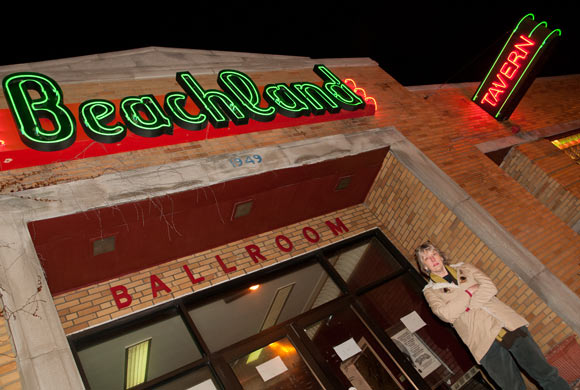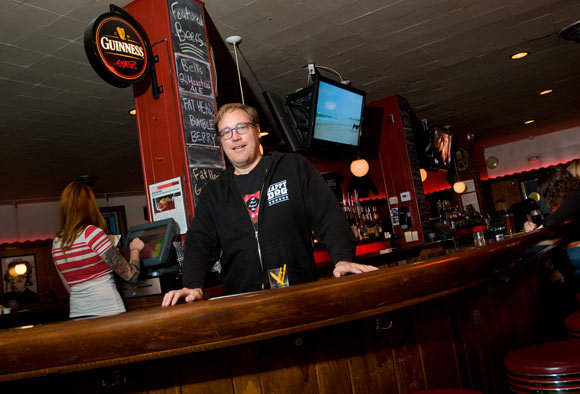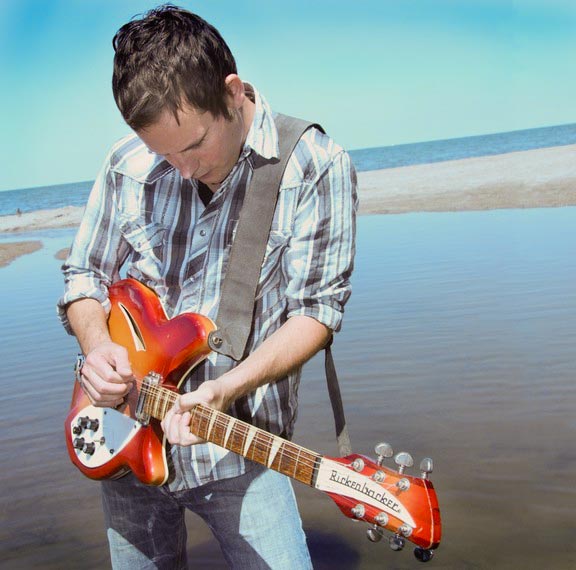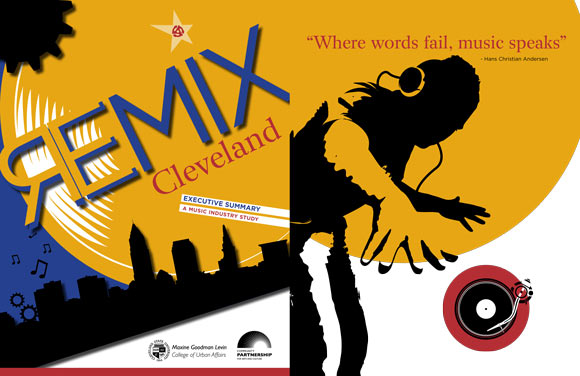come together: new collaboration seeks to amplify local music industry's $1B economic impact
From being the birthplace of the phrase "rock 'n' roll" and hosting the world's first rock concert in the 50s to being ground zero for legendary clubs that helped launch the careers of countless major acts in the 70s, Cleveland’s place in rock history has been firmly enshrined.
But these days, apart from bands like the Black Keys and Cloud Nothings getting their fair share of attention, Cleveland’s place in rock and roll’s present and future is considerably less secure. Dwindling population, urban sprawl and the lack of proactive marketing of Cleveland as a “music town” all have taken a toll on the city’s music economy.
“Mirroring Cleveland’s decline from its industrial heyday, the Cleveland music sector has also experienced a drop in prominence from the national music scene,” reported ReMix Cleveland, a 2011 study of the region’s music industry completed by the Community Partnership for Arts and Culture (CPAC). “Local musicians believe strongly that the sense is that ‘talented artists are from Cleveland, but don’t come to Cleveland.’”
Unlike the food scene and film industry, which have been touted nationally in recent years, Cleveland no longer enjoys a strong reputation as a music town. With relatively few hometown record labels or booking agents, no prominent regional strategy for promoting our music scene, and the sense -- right or wrong -- that rock bands must leave to find success, the birthplace of rock and roll has squandered more than a little of its former glory.
That’s not to say that Cleveland doesn’t have a vibrant local music scene. From local manufacturers like Gotta Groove Records, Dr. Z’s Amplifiers and American Bass to studios like Lava Room and touring bands like Mr. Gnome, Herzog and The Lighthouse and the Whaler, our music industry might be smaller than cities like Austin or Nashville, but it is close-knit, friendly and full of burgeoning new talent, say those in the know.
“We do have a viable economy here, we just don’t talk about it or know very much about it,” argues Cindy Barber, co-owner of the Beachland Ballroom and perhaps the foremost spokesperson on the city’s music scene. “It would be wonderful if we didn’t have to lose the next Black Keys, if they didn’t feel like they had to move out of town to Nashville.”
A billion dollar industry
The ReMix Cleveland study showed that Cleveland’s music sector, while fragmented, is comparable to many peer cities in our region. It consists of about 500 musicians, 8,320 individuals in music support positions, and an average annual wage of $42,000 (it goes without saying that most musicians have day jobs). The industry’s $115 million payroll increased 34 percent from 2000 to 2009, with a total economic output of $840 million.
Or, as Sean Watterson of the Happy Dog likes to put it, “The first politicians to recognize the music industry [in Northeast Ohio] will get credit for creating a billion-dollar industry.”
Of course, our music industry also contains some soaring high notes like the Cleveland Orchestra and top educational institutions like the Cleveland Institute of Music. At a grassroots level, the IngenuityFest and Lottery League have pumped fresh energy and innovation into Cleveland’s local music scene.
What’s missing is a sense of cohesion, policies to help the industry grow, and a regional marketing push. Yet advocates like Watterson and Barber are attempting to change that. The Cleveland Music Club Coalition, a cooperative of the city’s small clubs, landed a partial victory when the city rolled back its eight percent admissions tax so smaller clubs are exempt and mid-size clubs pay only four percent. Large halls over 500 remain at eight percent.
Now they’re trying to build off that success and the increased cohesion within the local music scene by raising the industry’s profile. Barber recently obtained nonprofit status for the organization she created, Cleveland Rocks: Past Present and Future, and this month she organized a photography show at SPACE: Rock Gallery that highlights the diversity within Northeast Ohio’s music economy.
“We want to push the music economy forward while we’re reviewing the past,” she says.
Cleveland Rocks has a small board of music industry vets and is in the process of expanding and seeking funding. It was a driving force behind the 2013 Lottery League, which is an effort to strengthen the region’s music industry by helping new bands to form and play music together. It also helped organize SPACE: Rock gallery.
Next, Barber wants to document Cleveland’s rock and roll history, help local bands grow and thrive, expand the network of music-based businesses, and support local live music. To do that, she’s considering designing a program that would incubate top local bands and give them the resources they need to launch their music careers beyond the 216.
Watterson, for his part, is working with CPAC and other groups to convene a regional music industry task force that would build on the groundwork laid by the ReMix report.
“I’d love for the music industry here to be recognized," he says. "For that to happen, the industry has to organize itself. We can’t just expect Cleveland to be recognized as a music town. Until we’re covered in the business section instead of the entertainment section, we’ll be viewed as more arts and entertainment than a regional industry.”
Building the audience
For Cleveland to be recognized as a music town, it has to be a place where musicians can earn a living plying their craft, easily find and collaborate with talent they need to gain success, and develop a touring base that allows them to reach fans anywhere. That’s both easier and harder than ever thanks to changes in the music industry.
On the plus side, while there’s a greater density of touring musicians, labels and agents in cities like Nashville, Cleveland is affordable and artists can be from anywhere in our virtual music economy. Yet at the same time, because artists can’t count on sales as their main source of revenue, a great live music scene has become very important.
Chris Allen is a local musician who first found fame with Rosavelt, a rock band that once toured the country in a van with four young guys scraping by on $15 per day. Though that venture largely flamed out after a few stellar albums, Allen is now a fixture on the local music scene, performing, writing original music and still occasionally touring.
“Music is such a complicated business right now,” says Allen. “I had a CD release party, and I had a girl tell me to my face, ‘My friends and I bought one CD so we’re going to split it.’ Back in the day, all five of her friends would have bought it. There’s still a demand for live music, but you’ve got to be more creative about promoting it.”
Cleveland has plenty of places to hear live, original music, with the Beachland and the Grog Shop leading the way for the past decade and newer venues like the Happy Dog, Now That’s Class and Mahall’s 20 Lanes springing up in recent years to plug the gaps. Still, with a surfeit of entertainment options locally, bringing in crowds can be a struggle.
To help build the audience for live music in Cleveland, entrepreneurs like Thomas Fox of Brite Winter Festival and Justin Markert of Cellar Door Music are helping to curate shows and act as the de facto marketing agents for Cleveland’s growing indie rock scene, which they say is chock-full of raw and largely unrecognized talent.
“I’ve had no problem finding people that blow my mind in terms of creative abilities,” says Fox, who expects to have 50 bands at this year’s Brite Winter Festival, which organizers launched three years ago to celebrate winter and promote indie music.
Markert’s Cellar Door has become a hybrid record label/booking agent/publicist for the region’s music scene, including bands like Ohio Sky. “We have tons of amazing bands in Cleveland -- it’s about getting as many people to know about them as possible.”
The Lottery League brought together over 150 musicians this year, and several have formed bands together. “The Lottery League is like a grow light,” explains Edward Angel Sotelo, who is one of the organizers. “You can put a seed out in the yard, but if you want it to grow fast, you put a grow light on it. We’re accelerating collaboration.”
Growing political force
Privately, Cleveland’s music advocates say they need to gain more clout so politicians will start to pay closer attention to the industry. The Music Club Coalition’s lengthy fight with the Jackson administration got ugly and personal at times, with club owners crying for relief while the city dug in its heels and maintained the fairness of its admissions tax.
This is despite the fact that the eight percent tax was higher than exists in many cities, hurt these smaller clubs economically, and brought in comparatively little revenue for the city. While a compromise was reached, many owners are still paying off back taxes, something that’s painful for owners like Barber, who have struggled to make it.
Watterson hopes to be able to put less punitive policies in place in the future, including possible tax credits that would support the growth of a local recording industry.
He notes that the renaissance of urban neighborhoods in the region often includes a live music venue that attracts thousands of visitors. “When you talk about arts and economic development stories, like the Happy Dog in Gordon Square or the Beachland Ballroom on Waterloo, it’s not a coincidence that you’ve got a live music venue in these areas.”









